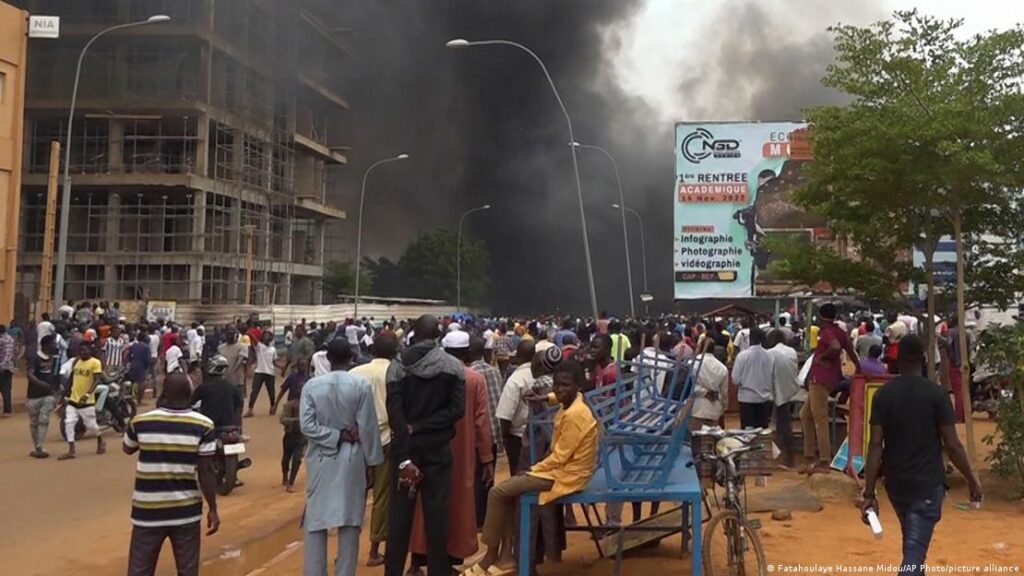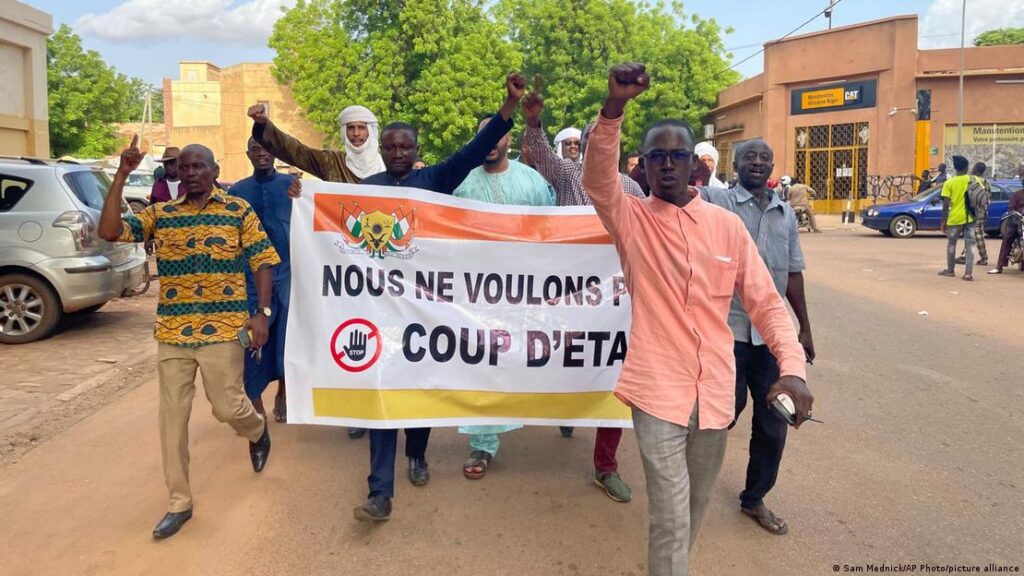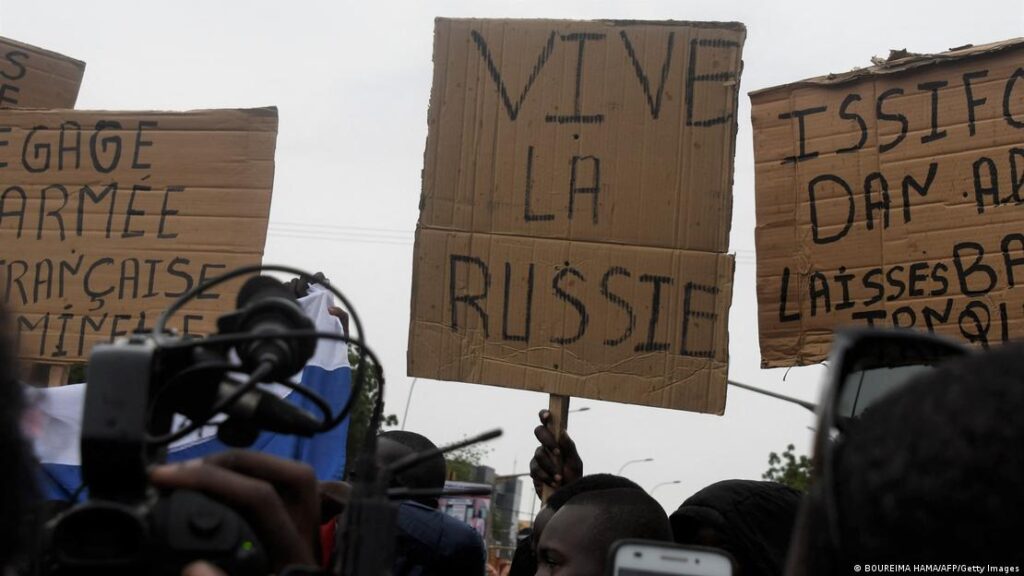Brussels indefinitely halts aid to the West African country and says it will not recognize new government. Washington threatens to cut aid and demands immediate restoration of order and democracy.
(DW) The European Union (EU) said on Saturday (29/07) that it will not recognize the government established in Niger after the coup d’état perpetrated by the military in the West African country.
The European bloc, along with the United States and other countries, are demanding the unconditional release of democratically elected President Mohamed Bazoum and the restoration of order.
Last Wednesday, soldiers from the Presidential Guard seized the seat of government in the capital, Niamey, and arrested Bazoum, who had been in power since 2021. He is detained at his official residence.
General Abdourahamane Tchiani, who had led the Presidential Guard since 2011, declared himself the country’s new head of state in a national address on Friday.
Suspension “indefinitely”
“The European Union does not and will not recognize the coup authorities in Niger,” EU diplomacy chief Josep Borrell said in a statement.
“All security cooperation is suspended indefinitely, and with immediate effect.” He also announced the suspension of the bloc’s financial aid to the country, which is experiencing severe economic problems.
Borrell stressed that Bazoum “remains the only legitimate president of Niger”, and called for his immediate release. He held the perpetrators of the coup responsible for the safety of the president and his family.
The diplomat said the EU stands ready to support future decisions to be taken by the bloc of countries in the region, “including the adoption of sanctions”. Nigerian President Bola Tinubu confirmed that leaders of the Economic Community of West African States will meet in Abuja this Sunday to discuss the situation.
Niger is one of the biggest recipients of aid from Western countries and a key EU partner in curbing illegal immigration through sub-Saharan Africa. The EU also has a small military contingent in the country on a training mission.
Brussels had dedicated €503 million of its budget between 2021 and 2024 for investments in education, sustainable growth and governance in Niger.

US threatens to cut financial support
U.S. Secretary of State Antony Blinken said Saturday that the takeover in Niger threatens U.S. economic support for the African country, and called for the “immediate restoration of democracy and order.”
“Our economic and security partnership with Niger – which means hundreds of millions of dollars – depends on the continuation of the democratic governance and constitutional order disrupted by the events of recent days,” the secretary said.
“This relevant assistance that we provide, which makes a material difference in the lives of the people of Niger, is under clear threat, and we have communicated this as clearly as possible to those responsible for the disruption to constitutional order and democracy in Niger.”
Blinken avoided referring to the military takeover as a coup, which could imply the immediate suspension of US financial support.
Closed borders and curfews
On Wednesday, one of the coup leaders, Colonel Amadou Abdramane, said in a televised statement that the defense and security forces had decided to “put an end to the regime due to the deteriorating security situation and poor governance.”
Abdramane announced that the country’s borders would remain closed and that a nationwide curfew would be imposed from Thursday from 10pm to 5am until further notice. The military also warned against any foreign intervention.
Neighboring Mali and Burkina Faso have also been suffering coups since 2020. The two countries face insurgencies by jihadist groups associated with the “Islamic State” (IS) and Al-Qaeda.
What is known about the military coup in Niger

The military overthrew the democratically elected government of Mohamed Bazoum, a Western ally against jihadism, marking the seventh coup in the west and central African region since 2020.
The military announced on Wednesday that it had seized power in Niger, an unstable and impoverished West African nation, after soldiers stormed the presidential palace in the capital, Niamey, and arrested the country’s democratically elected president, Mohamed Bazoum, who had been in power since 2021.
In a statement, broadcast on television on Wednesday, Colonel Amadou Abdramane, flanked by nine other uniformed officers, said the defense and security forces had decided to “put an end to the regime due to the deteriorating security situation and poor governance”.
The colonel also announced that the country’s borders would remain closed and that a nationwide curfew would be imposed from Thursday, from 10pm to 5am, until further notice. The military also warned against any foreign intervention.
On Friday, General Abdourahamane Tchiani, who had led the Presidential Guard since 2011, declared himself the country’s new head of state in a national address.
Bazoum is detained at his official residence. On Thursday, his Twiter profile posted a short statement. “The hard-won achievements will be safeguarded. All Nigerians who love democracy and freedom will see to that,” it read.
Meanwhile, Niger’s Foreign Minister Hassoumi Massoudou called on the population to oppose the coup.
One of the world’s poorest and most unstable nations
With more than 75% of its land area covered by the Sahara Desert and no access to the sea, Niger, a predominantly Islamic country of 25 million people, is one of the world’s poorest nations. Its Human Development Index (HDI) is only 0.400, which places the country at position 189 in the United Nations Development Program (UNDP) ranking, ahead of only Chad and South Sudan.
A former French colony that gained independence in 1960, the country has been the scene of four successful military coups and has had five different constitutions in recent decades. Bazoum, the current president, had in 2021 become the first elected head of state to assume power in a peaceful transfer of power from an equally elected predecessor – Mahamadou Issoufou. Still, Bazoum suffered a coup attempt two days before the inauguration.
Wave of coups in the region
The overthrow of the government in Niger marks the seventh coup in West and Central Africa since 2020. The last successful coup in Niger had taken place in 2010, when then-President Mamadou Tandja was overthrown by the military. Recently, other countries in the Sahel (the region comprising the transitional strip between the Sahara and sub-Saharan Africa), such as Mali and Burkina Faso, have also had their governments overthrown, with the military installed in power.
In both Mali and Burkina Faso, the military justified its actions with similar arguments to those of the Niger coup plotters, claiming that civilian governments were unable to contain the deteriorating security situation, affected by the action of Islamist jihadist groups.

Ousted government was Western ally in fight against jihadism
Mohamed Bazoum’s government was one of the West’s last allies in the Sahel, a region that has suffered for years from jihadists from groups linked to the Islamic State (IS) and al-Qaeda. Mali and Burkina Faso were home to French troops acting against jihadists before the coups, but they were forced to leave when the military that took power began cultivating closer ties with Russia.
Mali is currently one of the bases of operation for the Wagner mercenary group, which has been accused of committing massacres in the country. In April, Burkina Faso’s military junta was rumored to be negotiating with Russia to send mercenaries to the country. In 2016, France had already withdrawn the bulk of its troops from the Central African Republic, another country in the region affected by jihadism. Since then, the government of the African country has been supported by the Wagner Group.
After Mali, Burkina Faso and the Central African Republic turned away from the West, Niger began to concentrate military aid from the West. The United States says it has spent about $500 million since 2012 to help Niger boost its security capacity. Germany announced in April that it would step up its military cooperation with Niger. Berlin maintains a few dozen military personnel in the Nigerien capital as trainers and advisers. But the largest Western presence in Niger is that of France, which maintains more than 1,000 troops in Niamey and in regions affected by jihadist terrorism.
Now there are questions about how the new military government will handle the presence of Western forces. “Bazoum has been the West’s only hope in the Sahel region. France, the US and the EU [European Union] have spent a lot of their resources in the region to strengthen Niger and its security forces,” said Ulf Laessing, an expert on the Sahel region at Germany’s Konrad Adenauer Foundation. “A coup could change everything and also open the door for the expansion of Russia’s influence.”

International condemnation
Following the announcement of the coup, UN Secretary-General António Guterres said through a spokesperson that he “strongly condemns the unconstitutional change of government” in Niger and calls for “the immediate cessation of all actions that undermine democratic principles in Niger”.
France, a power with close ties to Niger, said it rejects “any attempt to seize power by force”.
The United States also demanded “specifically that members of the presidential guard release President Bazoum and refrain from all violence”, pointing out that Niger is “a crucial partner” for Washington. “I spoke with President Bazoum this morning [Wednesday] and made clear to him that the United States stands firmly behind him as the democratically elected president of Niger. We call for his immediate release,” said US Secretary of State Anthony Blinken.
African Union Commission Chairperson Moussa Faki Mahamat condemned what he called an “attempted coup” in Niger.
Bola Tinubu, president of neighboring Nigeria and chairman of the Economic Community of West African States (Ecowas), called the events in Niger “unpleasant developments” and said he was already promoting consultations with other leaders in the region on the situation. “The leadership of Ecowas will not accept any action that impedes the proper functioning of legitimate authority in Niger or any part of West Africa,” it said in a statement.
Germany’s government also condemned the coup. “We are following the events in Niger with great concern. We condemn the attempt by sections of the military to overthrow Niger’s constitutional democratic order and urge them to immediately release the democratically elected President Bazoum and return to their barracks,” the German Foreign Ministry said.
*** Translated by the DEFCONPress FYI Team ***
